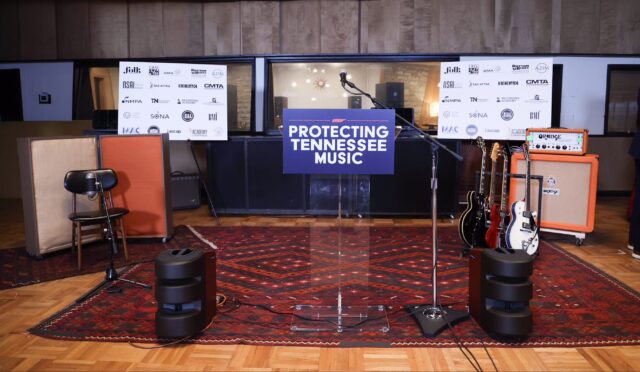
Nashville, TN – In a bold move to safeguard its iconic music industry, Tennessee has introduced pioneering legislation to combat the misuse of Artificial Intelligence (AI) in music. Governor Bill Lee has unveiled the Ensuring Likeness Voice and Image Security (ELVIS) Act, aimed at protecting artists against AI-driven impersonation and unauthorized use of their work. This legislation marks Tennessee as the first state to specifically address AI’s impact on music and artistic expression.
Key Highlights:
- The ELVIS Act seeks to amend Tennessee’s existing Protection of Personal Rights law by extending protections to include an artist’s voice, directly combating AI’s capability to mimic and misuse.
- The act was announced in the presence of leading figures from the music industry, signaling a strong collective effort to safeguard artists’ rights.
- Tennessee’s music sector, a cornerstone of the state’s cultural and economic identity, supports over 61,617 jobs and contributes $5.8 billion to the GDP.
- The legislation has garnered support from a wide array of music industry groups and associations, underscoring its significance and potential impact.
Protecting the Soul of Music
Tennessee, known as the heartland of American music with its vibrant scenes spanning from Nashville to Memphis, has always been a cradle for musical innovation and heritage. However, the advent of AI poses unprecedented challenges, enabling the creation of deepfakes and unauthorized replicas of artists’ work. Governor Lee’s initiative through the ELVIS Act reflects a proactive approach to protecting the unique voices and creative outputs of artists from being exploited by AI technologies.
The legislation not only aims to shield individual artists but also seeks to preserve the integrity and cultural value of the music industry at large. By making unauthorized AI-generated impersonations actionable under law, it sets a precedent for others to follow in the battle against digital counterfeiting and identity theft in the arts.
Industry and Legislative Support
The announcement was made at Nashville’s historic RCA Studio A, highlighting the bill’s importance to Tennessee’s music legacy. Notable attendees included CMA Entertainer of the Year Lainey Wilson and several other music industry luminaries. The move has elicited widespread approval from various stakeholders, including the Recording Academy, ASCAP, BMI, and the Nashville Songwriters Association International, among others.
This legislation is part of a broader discussion on the ethical use of AI in creative industries, addressing concerns about copyright infringement, identity theft, and the dilution of artistic authenticity. With the ELVIS Act, Tennessee not only aims to protect its artists but also to stimulate a national, if not global, dialogue on the intersection of technology and creative rights.
A Model for the Nation
As AI technology continues to evolve, the ELVIS Act serves as a potential model for other states and countries grappling with similar issues. It underscores the importance of adapting legal frameworks to address the challenges posed by digital and technological advancements. Governor Lee’s initiative reflects a commitment to innovation, while also ensuring that technological progress does not come at the expense of human creativity and rights.
The bipartisan support for the bill, along with its backing from a broad coalition of music industry groups, signals a strong consensus on the need to protect artists in the digital age. Tennessee’s stance could pave the way for federal legislation, with counterparts in Congress already working on similar measures.
Tennessee’s ELVIS Act represents a significant step forward in the effort to safeguard the rights and livelihoods of artists in the age of AI. By protecting the distinctive voices and creative expressions of musicians, the state not only preserves its rich musical heritage but also sets a precedent for ethical technology use worldwide. This legislation may well become a blueprint for future legal frameworks aimed at ensuring that innovation and tradition can coexist harmoniously in the digital era.










